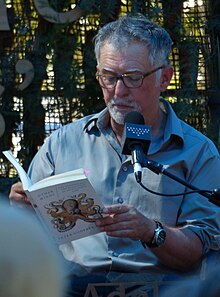Peter Godfrey-Smith | |
|---|---|
 Peter Godfrey-Smith reads from Other Minds at Adelaide Writers Week 2018 | |
| Born | 1965 (age 58–59) |
| Nationality | Australian |
| Education | |
| Awards | Lakatos Award |
| Institutions | |
| Thesis | Teleonomy and the Philosophy of Mind (1991) |
| Doctoral advisor | Philip Kitcher |
| Language | English |
Main interests | |
| Website | petergodfreysmith |
Peter Godfrey-Smith (born 1965) is an Australian philosopher of science and writer, who is currently Professor of History and Philosophy of Science at the University of Sydney.[1] He works primarily in philosophy of biology and philosophy of mind, and also has interests in general philosophy of science, pragmatism (especially the work of John Dewey), and some parts of metaphysics and epistemology. Godfrey-Smith was elected to the American Philosophical Society in 2022.[2]
Education and career
[edit]Born in Australia in 1965, Godfrey-Smith received a Ph.D. in philosophy from the University of California, San Diego in 1991 under the supervision of Philip Kitcher. He previously taught at Harvard University,[3] Stanford University, Australian National University, and the CUNY Graduate Center.[4] Godfrey-Smith was the recipient of the Lakatos Award[5] for his 2009 book, Darwinian Populations and Natural Selection which discusses the philosophical foundations of the theory of evolution.[6][7]
He has criticized the arguments of intelligent design proponents.[8] He was an early critic of Covid-19 lockdown measures, beginning with a series of Twitter posts in January 2021.[9][10][11]
Other Minds
[edit]In 2016, Godfrey-Smith published the book Other Minds: The Octopus, the Sea, and the Deep Origins of Consciousness.[12] It explores the origin of sentience, consciousness and intelligence in the animal kingdom, specifically how it evolved in cephalopods compared to mammals and birds.[13][14][15]
Selected publications
[edit]Books
[edit]- Complexity and the function of mind in nature. Cambridge: Cambridge University Press. 1996. ISBN 0-521-45166-3. OCLC 32468942.
- Theory and reality : an introduction to the philosophy of science (1st ed.). Chicago: University of Chicago Press. 2003. ISBN 0-226-30062-5. OCLC 51223665.
- Darwinian populations and natural selection. Oxford: Oxford University Press. 2009. ISBN 978-0-19-156778-0. OCLC 373185464.
- Other Minds: The Octopus, the Sea, and the Deep Origins of Consciousness. New York: William Collins. 2016. ISBN 978-0-374-22776-0. OCLC 957696590.
- Metazoa : animal life and the birth of the mind. New York: Farrar, Straus and Giroux. 2020. ISBN 978-0-374-20794-6. OCLC 1158510266.
References
[edit]- ^ "University of Sydney – Academic Staff". The University of Sydney. Retrieved 6 December 2018.
- ^ "The American Philosophical Society Welcomes New Members for 2022".
- ^ "Godfrey-Smith joins FAS as professor of philosophy". The Harvard Gazette. 16 February 2006. Retrieved 6 December 2018.
- ^ "A final talk by (and party for) Peter Godfrey-Smith". CUNY Philosophy Academic Commons. 2 December 2017. Retrieved 6 December 2018.
- ^ "Philosophy, Logic and Scientific Method".
- ^ Gewertz, Ken (8 February 2007). "The philosophy of evolution: Godfrey-Smith takes an evolutionary approach to how the mind works". Harvard University Gazette. Archived from the original on 11 October 2008. Retrieved 26 October 2008..
- ^ Darwinian Populations and Natural Selection. Oxford University Press. 2010.
- ^ Godfrey-Smith, Peter. (2001). Information and the Argument from Design. In Robert T. Pennock. Intelligent Design Creationism and its Critics: Philosophical, Theological and Scientific Perspectives. MIT Press. pp. 575–596.
- ^ Godfrey-Smith, Peter (2022). "Covid Heterodoxy in Three Layers". Monash Bioethics Review. 40 (1): 17–39. doi:10.1007/s40592-021-00140-6. PMC 8627291. PMID 34839458.
- ^ Akcay, Erol (2021). "Against "Covid Heterodoxy": Open Review of Godfrey-Smith, 2021" (PDF).
- ^ Godfrey-Smith, Peter (2021). "Reply to Ackay" (PDF).
- ^ Drake Baer (9 March 2017). "What's It Like to Be an Octopus?". New York Magazine. Retrieved 9 July 2017.
- ^ Carl Safina (27 December 2016). "Thinking in the Deep: Inside the Mind of an Octopus". New York Times. Retrieved 9 July 2017.
- ^ Philip Hoare (15 March 2017). "Other Minds by Peter Godfrey-Smith review – the octopus as intelligent alien". Guardian. Retrieved 9 July 2017.
- ^ Olivia Judson. "What the Octopus Knows". The Atlantic. Retrieved 9 July 2017.
Further reading
[edit]- Stubbings, Diane (January–February 2021). "Gradual evolution: investigating the origins of consciousness: review of Metazoa: animal minds and the birth of consciousness by Peter Godfrey-Smith". Australian Book Review. 428: 62.

Well, that’s interesting to know that Psilotum nudum are known as whisk ferns. Psilotum nudum is the commoner species of the two. While the P. flaccidum is a rare species and is found in the tropical islands. Both the species are usually epiphytic in habit and grow upon tree ferns. These species may also be terrestrial and grow in humus or in the crevices of the rocks.
View the detailed Guide of Psilotum nudum: Detailed Study Of Psilotum Nudum (Whisk Fern), Classification, Anatomy, Reproduction